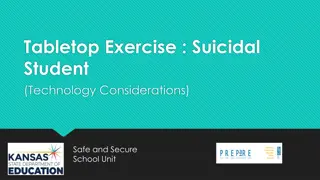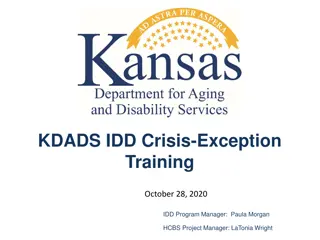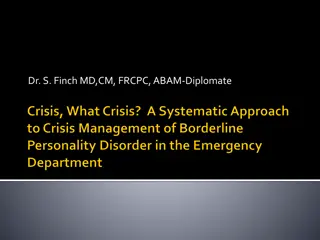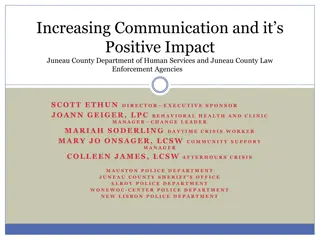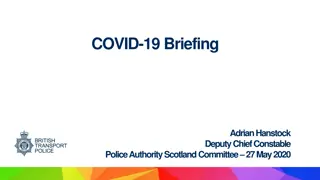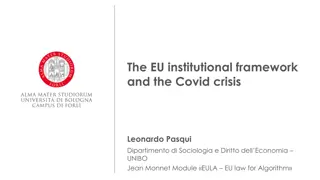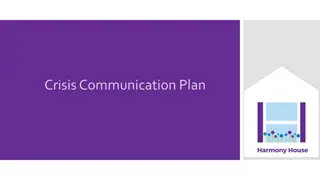Effective Crisis Management Strategies during COVID-19
Learn essential crisis management tactics to navigate the challenges posed by COVID-19. Explore the impact of crises, coping mechanisms, leadership strategies, and the importance of stress management and self-care for resilience. Gain insights on decision-making, team support, and fostering positivity amidst adversity.
Download Presentation

Please find below an Image/Link to download the presentation.
The content on the website is provided AS IS for your information and personal use only. It may not be sold, licensed, or shared on other websites without obtaining consent from the author. Download presentation by click this link. If you encounter any issues during the download, it is possible that the publisher has removed the file from their server.
E N D
Presentation Transcript
COVID-19 Crisis Management
Training Schedule Introduction Crisis Crisis Management Planning for Crises 2
Crisis 3
Topics What is Crisis? The Toll Cope and Lead Through It The Reality 4
What is Crisis? Events that produce significant stress Traumatic change in an individual s life that affect cognition and emotional levels. Turning point for better or worse State of instability 5
The Toll Decision Making: concentration is reduced, creativity is limited and processing information becomes difficult. Risk to miss opportunities and the message of hope to keep the team focused. Becoming rigid and trying to control the crisis response on your own increases personal stress levels. Irritability, impatience with others affects the work environment and professional relationships and can narrow a leader s perspective. Sleep disturbances and deprivation lead to being less cooperative and less aware of your responses to others. Display of emotions such as anger and irritability where trust is reduced. 6
Cope & Lead Through It For better reception of input, step back, pause, focus and re-assess the situation. To increase awareness of potential signs of stress, take a break every hour. Practice self-care through movement, exercise, indoor/ outdoor activities, healthy nutrition and communication with others. Sleep Hygiene: quality of sleep matters! Implement break times to support team members who may be in need. Share and/or delegate responsibilities: Learn to rely on others so you ll have time and mind-space to look ahead strategically. Recognize positive things during challenging times. Acknowledge and celebrate successes (big and small). 7
The Reality Stress is a regular part of our lives COVID-19 has intensified the stress around us Effective leaders have the experience to manage stress during decision-making processes Even effective leaders feel worn down during the pandemic Practicing stress management & self-care builds resilience and the ability to manage future crises. 8
Topics What s Crisis Management? Crisis Management Elements Crisis Management Components Critical Brain Areas (Video) Information Processing Crisis Management Steps Post-Crisis Resilience 10
What is Crisis Management ? Organization and mobilization of resources to: 1. Overcome difficulties introduced by unexpected threats 2. May reduce the information-processing 3. Important when considering possible solutions 11
Crisis Management Elements Honesty Establish Rapport Truthfulness Proactive Empathy 12
Crisis Management Components Crisis Center facility/setting established for emergencies. Crisis Intervention seek improvement or to mitigate the situation. Prevents more serious consequences. Crisis Intervention Service services typically provided by government or social service agencies during emergencies/disasters and personal crises (hot- lines, drop-in services, on-site intervention). Crisis Team group of professionals trained to help individuals cope during and after an emergency. 13
Information Processing During a crisis, people s ability to process information may be compromised. Consider the following strategies: 1. Overcome over-simplified or missed information by applying simple and clear communication. 2. Overcome resistance to change by utilizing credible sources. 3. Messaging may be reinforced with information or resources provided by other sources or organizations, but credibility and accessibility should should be confirmed before sharing. 4. In the absence of information or communication, credible speculation may be applied but it should be simple and consistent. 15
Crisis Management Steps 1. Develop a pre-crisis process: Planning & preparation (identify resources, trainings, establish partnerships, apply needs assessment) a. Gather information about what happened b. Separate facts from rumors c. Provide clear and timely communication d. Coordinate with other groups e. Monitor intensity of the event f. Listen to partners and team members g. Incorporate feedback h. Explain rationale/justify recommendations 16
Crisis Management continued 2. Results and Evaluation a. Debrief the situation from start to finish b. Promote actition within your organization c. Assess performance d. Document lessons learned e. Plan activities to improve the crisis plan 17
Post-Crisis Resilience Experiencing crisis can result in positive outcomes. Survivors often gain: A new understanding of risks and ways to manage crisis in the future. A sense of strength and empowerment New skills to manage challenging times Opportunities for personal, group and community growth 18
Topics Small-Group Discussion Developing A Plan 20
Small Group Discussion Apply the Steps of Crisis Management: 1. Telephone A Case or Contact tells you they are having suicidal thoughts. What will you do to support this person? 2. In-person A co-worker is very irritable and tells you they are having problems at home and their stress level is at its highest point. What will you do to support this person? 3. Remote You are on a Zoom call and your colleague turns their camera off, states they are under a lot of pressure, and stops talking for a significant amount of time. What will you do to support this person? 21
Breakout 15 Minutes 22
Developing A Plan Pre-crisis stage: 1. Document your emergency contacts. 2. Identify emergency resources available in your setting (shelter, water, food, etc.) Plan your crisis management steps: Who is the designated leader? Who will perform specific support roles? Who will assist those who need help? What is the first, second, third action will you take, etc. How will events that occurred be debriefed with a supervisor or colleague? 23
Training Calendar Additional Workshops: De-escalation Skill Building Motivational Interviewing Cultural Responsiveness Accessing Interpreter Services Pandemic Specific Resources 25
THANK YOU! We are grateful for your investment in keeping Oregonians safe! 26

 undefined
undefined










